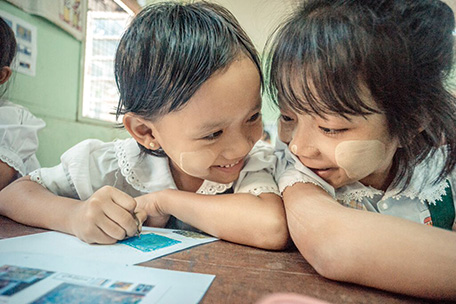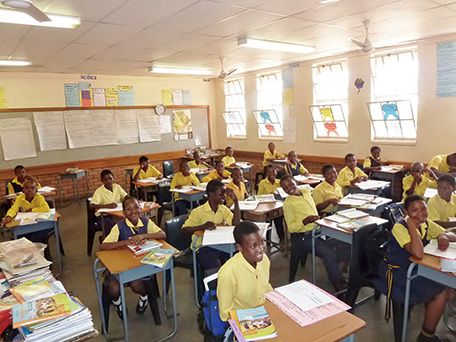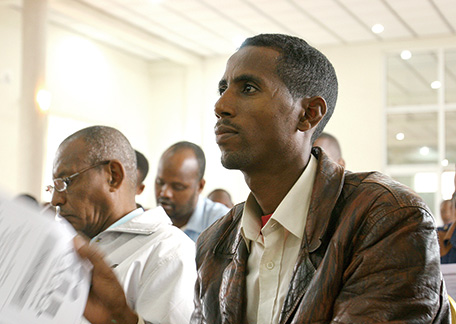(3) Quality Education for All
Education plays an important role in the socio-economic development that is needed for poverty reduction. It also enables individuals to develop their potential and capability, as well as to live with dignity. Education fosters understanding of other people and different cultures, and forms the foundation for peace. However, approximately 57 million children worldwide are still out of school, despite the fact that achieving universal primary education was one of the MDGs with the target date of 2015. Furthermore, new problems have been indicated. For example, in countries and regions affected by conflict, the proportion of out-of-school children that was 30% in 1999 increased to 36% in 2012(Note 14).
To improve this situation, the Incheon Declaration that compiles recommendations for education beyond 2015 was unveiled at the World Education Forum 2015* held in the Republic of Korea (Incheon) in May 2015. The Declaration urges the international community to make efforts to expand access to education.
In the 2030 Agenda for Sustainable Development adopted at the UN to succeed the MDGs, Goal 4 of the SDGs is identified as “Ensure inclusive and equitable quality education and promote lifelong learning opportunities for all,” in order to address the education goal from the MDGs, which remains unachieved.
The international community has been committed to realizing Education for All (EFA).* Following EFA, in order to achieve the more comprehensive Goal 4, the Education 2030 Framework for Action* was adopted at the Education 2030 High-Level Meeting held in November 2015.
< Japan’s Efforts >

Children receive pilot lessons using new textbooks created under the project at the Yankin Education College Practicing School in Yangon, Myanmar. In the arts and crafts class, the children show each other their drawings. (Photo: Chiko Yamaoka / JICA)
Emphasizing “nation-building” and “human resources development,” Japan has been providing developing countries with a broad range of support for education, including the enhancement of basic education,* higher education, and vocational training.
At the timing of the UN Summit for the adoption of the 2030 Agenda for Sustainable Development in September 2015, Japan announced a new education cooperation strategy entitled, Learning Strategy for Peace and Growth. The new strategy was formulated to serve as a thematic policy in the field of education under the Development Cooperation Charter approved by the Cabinet in February 2015. In formulating the strategy, a wide range of views was exchanged with experts, NGOs, international organizations, and other parties. The new strategy aims to achieve quality education through mutual learning under the following basic principles: (i) Education cooperation to achieve inclusive and equitable quality learning; (ii) Education cooperation for industrial, science and technology human resources development and building the foundation of socio-economic development; and (iii) Establishment and expansion of global and regional networks for education cooperation. In the years ahead, Japan will further contribute to education assistance in accordance with the new strategy.
In March 2015, Japan and the United States unveiled the United States and Japan – Collaborating to Advance Girls Education Around the World, which vows to promote assistance for the education of girls. Additionally, Japan contributes proactively to the discussions for formulating the framework for action that will succeed the EFA Framework for Action adopted in November 2015.

Pupils at the Mmupashalala Primary School in the Mahalapye district in the eastern part of Botswana study in a school building electrified through Japan’s Grant Assistance for Grass-roots Human Security Projects. (Photo: Yukari Johnston / Embassy of Japan in Botswana)
Also, with regard to the Global Partnership for Education (GPE),* which lays out the international framework for achieving universal primary education, Japan has actively participated in the discussions for formulating a new GPE strategic plan beyond 2016 and in the reform efforts. Furthermore, Japan’s contributions to GPE funds from FY2007 to FY2014 totaled approximately $20.6 million.
Regarding initiatives for Africa, at TICAD V held in June 2013, Japan announced that it would provide quality educational environments for 20 million children over the course of five years starting in 2013, through the expansion of support for math and science education improvement and school management improvement projects. Japan is steadily implementing these initiatives.
Furthermore, in order to contribute to the development of education and the improvement of its quality in the Asia-Pacific region, Japan contributes to the United Nations Educational, Scientific and Cultural Organization (UNESCO) in the form of Funds-in-Trust to implement projects for improving the management capacity of community learning centers for literacy education, among other purposes.
In Afghanistan, an estimated 11 million people (about 40% of the population) are illiterate due to the impact of nearly three decades of civil war. Therefore, the Government of Afghanistan advances literacy education for the people. Japan has contributed to the promotion of literacy education in Afghanistan by extending a total of approximately ¥5.3 billion in grant aid through UNESCO since 2008, which provided literacy education to 1 million people in 100 districts of 18 provinces in Afghanistan.
In recent years, Japan has been promoting transnational networking of higher education institutions and joint research projects among neighboring countries. Japan also supports human resources development in developing countries by accepting international students to Japanese institutions of higher education and other institutions in accordance with the 300,000 International Students Plan and through other such measures.
In addition, Japan strives to make it easier for Japanese in-service teachers to go overseas as Japan Overseas Cooperation Volunteers (JOCV) under the Special Program for School Teachers.* In-service teachers dispatched to developing countries contribute to educational promotion and development in their countries of destination, and make use of their experiences as JOCVs in the Japanese educational context upon their return to Japan.
- *World Education Forum 2015
- World Education Forum 2015 is an international education conference held in Incheon, the Republic of Korea in May 2015. Attended by the UN Secretary-General, education ministers, and high-level officials, the conference discussed education beyond 2015 and adopted the Incheon Declaration on the final day. During the conference, the Japanese government delegation called upon members to promote Education for Sustainable Development (ESD), among other actions.
- *Education for All (EFA)
- EFA is an international movement aimed at ensuring everyone in the world has the opportunity to receive at least basic education. The five main organizations involved in EFA are UNESCO, the World Bank, the United Nations Development Programme (UNDP), the United Nations Children’s Fund (UNICEF), and the United Nations Population Fund (UNFPA), with UNESCO serving as the overall coordinator.
- *Education 2030 Framework for Action
- This framework for action succeeds the EFA Dakar Framework for Action aimed at achieving education for all, adopted at the World Education Forum in Dakar, Senegal in 2000 with a target date of 2015. The Education 2030 Framework for Action was adopted at the Education 2030 High-Level Meeting, which was held to coincide with the UNESCO General Conference in November 2015.
- *Basic education
- Basic education is educational activities designed to enable individuals to acquire the knowledge, values, and skills needed to live. It mainly refers to primary education, lower secondary education (equivalent to Japanese junior high school), pre-school education, and adult literacy education.
- *Global Partnership for Education (GPE)
- GPE refers to a framework for international cooperation established under the leadership of the World Bank in 2002, in order to achieve universal primary education by 2015 that is included in the MDGs and the EFA Dakar goals (formerly known as Fast Track Initiative [FTI]).
- *JOCV under the Special Program for School Teachers
- The program is designed to facilitate in-service teachers’ participation in international cooperation. Teachers who are recommended by MEXT to JICA are exempt from the preliminary technical test. The period between the pre-dispatch training and the termination of dispatch is two years (compared to the usual two years and three months), beginning in April and ending in March to match the Japanese school year.
- Note 14: “The Millennium Development Goals Report 2015” (UN)
Ethiopia
Project for Capacity and System Development of National Educational Assessment and Examinations in Science and Mathematics
Technical Cooperation (September 2014 – Ongoing)

Participants listening intently at a workshop. (Photo: Jun Tsukui)
Ethiopia is working to foster human resources in science and mathematics who can help develop the country’s technologies and achieve greater industrialization. To this end, the Government of Ethiopia formulated and has been currently implementing the Education Sector Development Programme. However, the rate of students who complete their primary education has remained low, standing at 55% as of 2009. As such, Ethiopia faces the urgent challenge of raising the primary education completion rate in order to increase the number of students who major in science and mathematics at the university level.
An important means of addressing this challenge is to improve the quality of education by developing teachers’ abilities. The Government of Japan has provided assistance to help develop a training system for practicing science and mathematics teachers at the seventh and eighth grade levels in primary education in Ethiopia. This has achieved a certain degree of success in improving the quality of instruction.
However, the questions asked in national exams still placed excessive emphasis on knowledge, making it impossible to overcome the conventional focus on rote memorization. There were also many teachers who could not fully comprehend the skills and abilities that students needed to acquire. This was not only because of shortcomings in teachers’ abilities, but also because of a lack of consistency in the education system, resulting from differing views among education officials about an appropriate curriculum or testing methods used to evaluate academic ability. In light of this, Japan began providing assistance in 2014 to improve the quality of Ethiopia’s education strategy, encouraging a more integrated approach, from formulating the curriculum to conducting lessons and evaluating academic ability.
As part of this assistance project, Japanese experts are charged with aiding the capacity building of education officials through the development of teaching materials and exam questions covering science and mathematics for seventh and eighth graders in primary education. Specifically, science and mathematics teachers and those in charge of formulating exam questions are asked to attend a workshop led by Japanese experts. At the workshop, participants are separated into working groups for individual subjects such as mathematics, biology and physics. Each group works to create teaching materials and improve test questions so that even tests designed to gauge learning progress yield benefits for the students. The teachers who took part in this workshops are enthusiastically reviewing exam questions and participating in discussions about teaching instruction.
It is hoped that by improving their capabilities through participation in this Japanese-led initiative, Ethiopia’s science and mathematics teachers can play an important role in contributing to raising primary education completion rates and the percentage of students moving on to secondary education. (As of August 2015)
